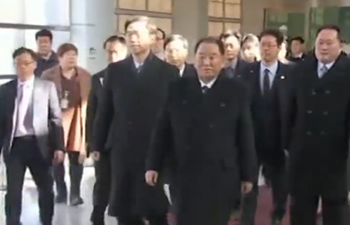MEXICO CITY, June 3 (Xinhua) -- An escalating tariff dispute between Mexico and the United States could put an end to the North American Free Trade Agreement (NAFTA), the Institute for Industrial Development and Economic Growth (IDIC) said on Sunday.
But that's not necessarily a bad thing, the prestigious group, which advises government, said.
In its latest report, titled "The 2018 Challenge: Rebuilding the Vision of Mexico," the IDIC said the country must brace for the possible death of NAFTA, the nearly 25-year trade deal between Canada, Mexico and the United States.
That would not mean "the end of economic exchange in the region, but it would mean the beginning of the construction of another legal framework for interaction," the institute says.
U.S. President Donald Trump, who believes NAFTA shortchanged U.S. industry, insisted the deal be renegotiated to secure better terms for the United States.
At the same time, his government is pursuing protectionist measures, arguing that protecting the U.S. steel sector, for example, is a national security concern.
As of June 1, the U.S. imposed steep tariffs on imported steel (25 percent) and aluminum (10 percent) from the European Union as well as its NAFTA partners.
Mexico has said it will retaliate with tariffs on U.S. imports.
"Our country cannot depend on the decision of a single man, or the interests of another nation," the group said, adding that "the time has come to modify the strategy of our economic policy."
After seven rounds of negotiations, NAFTA's partners are still far from resolving key differences, invariably due to U.S. intransigence, the institute said.
"Multilateral agreements get in Trump's way ... that's why he seeks to establish bilateral negotiations in which he can impose, or in the best case scenario, influence" the outcome to his advantage, the IDIC said.
"We must be calm and objective, and acknowledge that NAFTA could come to an end," but with a unified national policy, Mexico could forge beneficial bilateral trade deals with its neighbors and other regions, said the institute.













